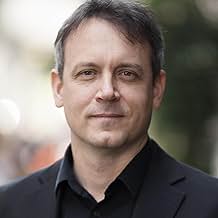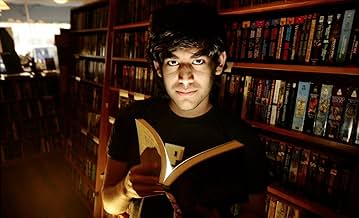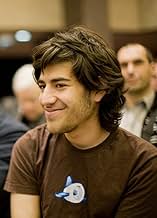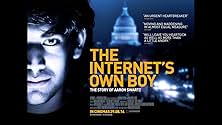The story of programming prodigy and information activist Aaron Swartz, who took his own life at the age of 26.The story of programming prodigy and information activist Aaron Swartz, who took his own life at the age of 26.The story of programming prodigy and information activist Aaron Swartz, who took his own life at the age of 26.
- Awards
- 4 wins & 4 nominations total
Aaron Swartz
- Self
- (archive footage)
Stephen Heymann
- Self - Asst. U.S. Attorney Massachusetts
- (archive footage)
- Director
- Writer
- All cast & crew
- Production, box office & more at IMDbPro
8.018.4K
1
2
3
4
5
6
7
8
9
10
Featured reviews
A good documentary of a very important subject.
This is a very good documentary of a subject that EVERYONE should be interested in. If you're interested in the Internet, technology, open publishing (science or law), or freedom, you MUST watch this documentary. It's a moving and disturbing story of a very important young man, and how the government tried to make an example out of him.
Where it fails, is dealing with Aaron's mental health issues. His struggles with depression (which he documented in his blog) were glossed over, and even dismissed (such as when he brother said he didn't remember any mood swings as a child). I think this was purposefully done to fit the thesis of the documentary (that the prosecution backed him into a corner), and ignores a major part of Aaron's life. Just because he was "at-risk" due to mental illness, doesn't mean he wasn't targeted and persecuted. Instead, his depression was swept under the rug by the filmmaker, as it so often is in our society.
Overall, this is a very important film and I would highly recommend it. However, read Aaron's blogs and writings for supplemental info!
Where it fails, is dealing with Aaron's mental health issues. His struggles with depression (which he documented in his blog) were glossed over, and even dismissed (such as when he brother said he didn't remember any mood swings as a child). I think this was purposefully done to fit the thesis of the documentary (that the prosecution backed him into a corner), and ignores a major part of Aaron's life. Just because he was "at-risk" due to mental illness, doesn't mean he wasn't targeted and persecuted. Instead, his depression was swept under the rug by the filmmaker, as it so often is in our society.
Overall, this is a very important film and I would highly recommend it. However, read Aaron's blogs and writings for supplemental info!
9xWRL
The tragic story of Aaron Swartz, told by those closest to him
This warm yet chilling documentary retraces the life of Aaron Swartz, who committed suicide at age 26 after a couple of years of severe and deepening pressure from the criminal justice system, which was trying him for a number of felonies resulting from his breaking into MIT's computers.
We first see him as a young kid in home movies, then as a prodigy who while very young was brimming with new ideas for the Internet and applied genius-level programming skills to co-developing RSS and Reddit. Bored with college and with working for the business establishment, he turned to activism, promoting an open Web culture for the benefit of all users.
Swartz's activism turned into hacktivism, landing him in deep trouble with the Justice Department, which charged him with crimes that could have sent him to prison for 35 years. Touching, pointed accounts from family members and close associates describe what Aaron was like and how he responded to unyielding Justice Department efforts to use him as an example.
The interviews with law professor Lawrence Lessig and World Wide Web inventor Tim Berners-Lee are unforgettably moving. The film does a good job of calling into question Swartz's harsh treatment by the same Justice Department that shied away from prosecuting the big money interests that brought down our financial system.
Whether you sympathize with Swartz or not, the film does a solid job of showing how blind justice in the U.S. can be when it wants to be.
We first see him as a young kid in home movies, then as a prodigy who while very young was brimming with new ideas for the Internet and applied genius-level programming skills to co-developing RSS and Reddit. Bored with college and with working for the business establishment, he turned to activism, promoting an open Web culture for the benefit of all users.
Swartz's activism turned into hacktivism, landing him in deep trouble with the Justice Department, which charged him with crimes that could have sent him to prison for 35 years. Touching, pointed accounts from family members and close associates describe what Aaron was like and how he responded to unyielding Justice Department efforts to use him as an example.
The interviews with law professor Lawrence Lessig and World Wide Web inventor Tim Berners-Lee are unforgettably moving. The film does a good job of calling into question Swartz's harsh treatment by the same Justice Department that shied away from prosecuting the big money interests that brought down our financial system.
Whether you sympathize with Swartz or not, the film does a solid job of showing how blind justice in the U.S. can be when it wants to be.
In the age of piracy, SOPA, and net neutrality, this is a must see.
When a documentary can illicit tears of both anger and sadness, you know it must be doing something right. Such is the case with The Internet's Own Boy: The Story of Aaron Swartz. Aaron Swartz was one of the co-founders of the internet's so called front page; Reddit. He was also one of the most outspoken and inspired activists fighting to keep the internet free, protecting the rights and privileges of the American people whose government was trying tirelessly to censor the free speech granted by the web. Tragically, he took his own life at the age of 26 due to the constant pressures and endless scrutiny and indictment placed onto him by the American government. This film chronicles his tragically short life and attempts to put Aaron's name out there for the sake of carrying on his legacy. There aren't a whole lot of documentaries or films in general out there that I would say it is crucial that you watch. However, The Internet's Own Boy is one of these films. It pulls back the curtain on one of the most significant and relevant issues of our modern era, which is fighting censorship and maintaining the ability to access and attain the necessities the internet grants us. For instance the film starts out by showing us Swartz's many hacking campaigns where he would obtain legal and court documents from the American courts that one would otherwise have to unfairly pay for, and making it free to the public. It shows Aaron's fight for people's right to information, something the government seems to be stopping at nothing to revoke. It's truly sickening to see the things that Aaron, his friends, and his colleagues are put through in their fight for such a just cause. There are parts of this film that are absolutely infuriating, and there are parts that inspire as much as the other moments enrage. The victorious battle against the SOPA bill, for instance, highlights one great victory that shows off the American people's ability to make change happen, and fight back against what they know is wrong. This film shows what civil disobedience, protest, and the aptly coined term "hacktivism" are capable of, but it also shows the ignorant unfairness of what the government is capable of as well. Hence the frustration. It highlights the absurd idiocracy of a system stuck in the past, one that literally bases its bylaws off of The Computer Fraud and Abuse Act written in the 1980's when computers were a brand new idea and the endless scope of the internet wasn't even a conceived notion yet. The Internet's Own Boy strikes at a lot of issues that so easily get swept under the rug, and urges all of its viewers to be conscious of our rights and whether or not they are being stripped from us, because it can happen right under our noses. It concedes to us that we can't settle for unfair censorship and we must continue to fight back against a system that wants to tie our hands behind our backs and put duct tape over our mouths. Yes, the story of Aaron Swartz is a very sad one, and the film strikes emotional chords that give a beautiful amount of weight to the story being told. But the goal of The Internet's Own Boy is not to sour our moods with the tragic story of one of the 21st century's greatest minds. It is to raise awareness of this war against censorship; a war that can and must be won. The relevance of the issue is too immediate and too vital to our free speech system to be ignored. If you use the internet, you must see The Internet's Own Boy, and you must help carry on Aaron Swartz's noble legacy.
A deeply moving and very disturbing documentary
In a world where idealism is a scarce commodity, Aaron Swartz stood out. A computer programmer and political and social activist, Aaron had a quaint goal — to make the world a better place, to help us live our lives so that they make a difference. Ultimately, however, though he tried to save the world, he could not save himself. On January 11, 2013, Swartz, age 26, hanged himself in his New York apartment, after having been vigorously pursued by the U.S. Department of Justice for two years for hacking MIT's computer network and downloading 4.8 million documents from the JSTOR database, a private corporation that charged exorbitant fees for non-subscribers to view online research.
Swartz's story is told in a deeply moving and very disturbing documentary The Internet's Own Boy: The Story of Aaron Swartz, directed by Brian Knappenberger. The film traces Swartz' life from the time he was a three-year-old prodigy able to read a meeting notice posted on the refrigerator to his later years when he created the prototype for Wikipedia, helped start up RSS and Reddit and wrote specifications for Creative Commons, an organization devoted to enabling the free distribution of an otherwise copyrighted work. Wherever he was, however, he challenged the system and the corporate organizational structure whether it was in high school, Stanford University, or Silicon Valley.
Though the film does not break new ground stylistically, the interviews with Aaron's family, girlfriends, and friends such as Net activists Tim Berners-Lee who created the World Wide Web and author Cory Doctorow are illuminating and often inspiring. Some of the best scenes are Swartz's political campaign to defeat SOPA, the Stop Online Piracy Act introduced in Congress and expected to pass. He galvanized the opposition with creative use of the Internet to ultimately defeat a bill he thought would restrict Internet freedom. He also worked for now Senator Elizabeth Warren, one of the few progressive voices in our politics.
Swartz defended his action in hacking MIT's computers in a manifesto that read in part, "Information is power. But like all power, there are those who want to keep it for themselves. The world's entire scientific and cultural heritage, published over centuries in books and journals, is increasingly being digitized and locked up by a handful of private corporations. Want to read the papers featuring the most famous results of the sciences? You'll need to send enormous amounts to publishers like Reed Elsevier." In the tradition of Thoreau, he said, "There is no justice in following unjust laws. It's time to come into the light and, in the grand tradition of civil disobedience, declare our opposition to this private theft of public culture." While Aaron's decision to free scholarly works from MIT from private corporate control may have been ill-advised, the government's treatment of him as a dangerous criminal was unwarranted and out of proportion to the crime. Originally indicted on four counts, after his SOPA campaign was successful, Carmen Ortiz, U.S. Attorney for the district of Massachusetts, upped the number of counts to thirteen to "send a message." She accused Swartz of violating Title 18 of the U.S. Code, which carries a maximum penalty of 50 years in jail and one million dollars in fines.
Ortiz who pursued the case even after JSTOR agreed to drop the charges, justified the indictment by saying, "stealing is stealing whether you use a computer command or a crowbar, and whether you take documents, data, or dollars." Attorney General Eric Holder defended Ortiz's prosecution before the Senate Judiciary Committee, terming it, "a good use of prosecutorial discretion." After Swartz' death, Ortiz issued a statement saying that her office had never intended to seek maximum penalties against him, a small consolation to Swartz' family.
In contrast, the U.S. Department of Justice never intended to seek ANY penalties against those responsible for the financial manipulations and fraud that wiped out the jobs and living standards of millions of people. The Internet's Own Boy: The Story of Aaron Swartz is not just an advocacy film, but a character study of a young man who was not afraid to challenge what he thought was an unjust system. A clip is shown of Swartz saying, "I think you should always be questioning, I take this very scientific attitude in which everything you've learned is just provisional, that it's always open to recantation, refutation I think the same thing applies to society." As a fitting epitaph to Aaron's life, author Justin Peters, recalled an event held one week after his death. A large banner was spread out on a table where people recorded memories of Aaron and messages of condolence. According to Peters, "near the end of the night, a slender boy in a plain sweatshirt who looked too young to be there came over to the table. He uncapped a marker. He wrote simply, 'We will continue.'"
Swartz's story is told in a deeply moving and very disturbing documentary The Internet's Own Boy: The Story of Aaron Swartz, directed by Brian Knappenberger. The film traces Swartz' life from the time he was a three-year-old prodigy able to read a meeting notice posted on the refrigerator to his later years when he created the prototype for Wikipedia, helped start up RSS and Reddit and wrote specifications for Creative Commons, an organization devoted to enabling the free distribution of an otherwise copyrighted work. Wherever he was, however, he challenged the system and the corporate organizational structure whether it was in high school, Stanford University, or Silicon Valley.
Though the film does not break new ground stylistically, the interviews with Aaron's family, girlfriends, and friends such as Net activists Tim Berners-Lee who created the World Wide Web and author Cory Doctorow are illuminating and often inspiring. Some of the best scenes are Swartz's political campaign to defeat SOPA, the Stop Online Piracy Act introduced in Congress and expected to pass. He galvanized the opposition with creative use of the Internet to ultimately defeat a bill he thought would restrict Internet freedom. He also worked for now Senator Elizabeth Warren, one of the few progressive voices in our politics.
Swartz defended his action in hacking MIT's computers in a manifesto that read in part, "Information is power. But like all power, there are those who want to keep it for themselves. The world's entire scientific and cultural heritage, published over centuries in books and journals, is increasingly being digitized and locked up by a handful of private corporations. Want to read the papers featuring the most famous results of the sciences? You'll need to send enormous amounts to publishers like Reed Elsevier." In the tradition of Thoreau, he said, "There is no justice in following unjust laws. It's time to come into the light and, in the grand tradition of civil disobedience, declare our opposition to this private theft of public culture." While Aaron's decision to free scholarly works from MIT from private corporate control may have been ill-advised, the government's treatment of him as a dangerous criminal was unwarranted and out of proportion to the crime. Originally indicted on four counts, after his SOPA campaign was successful, Carmen Ortiz, U.S. Attorney for the district of Massachusetts, upped the number of counts to thirteen to "send a message." She accused Swartz of violating Title 18 of the U.S. Code, which carries a maximum penalty of 50 years in jail and one million dollars in fines.
Ortiz who pursued the case even after JSTOR agreed to drop the charges, justified the indictment by saying, "stealing is stealing whether you use a computer command or a crowbar, and whether you take documents, data, or dollars." Attorney General Eric Holder defended Ortiz's prosecution before the Senate Judiciary Committee, terming it, "a good use of prosecutorial discretion." After Swartz' death, Ortiz issued a statement saying that her office had never intended to seek maximum penalties against him, a small consolation to Swartz' family.
In contrast, the U.S. Department of Justice never intended to seek ANY penalties against those responsible for the financial manipulations and fraud that wiped out the jobs and living standards of millions of people. The Internet's Own Boy: The Story of Aaron Swartz is not just an advocacy film, but a character study of a young man who was not afraid to challenge what he thought was an unjust system. A clip is shown of Swartz saying, "I think you should always be questioning, I take this very scientific attitude in which everything you've learned is just provisional, that it's always open to recantation, refutation I think the same thing applies to society." As a fitting epitaph to Aaron's life, author Justin Peters, recalled an event held one week after his death. A large banner was spread out on a table where people recorded memories of Aaron and messages of condolence. According to Peters, "near the end of the night, a slender boy in a plain sweatshirt who looked too young to be there came over to the table. He uncapped a marker. He wrote simply, 'We will continue.'"
It's a sad story, but one worth hearing
I don't know why the Aaron Swartz story was never on my radar, which is one of the reasons why The Internet's Own Boy was an eye-opener. His is a tragic story, and although the filmmakers secured screen time with (almost) all involved, it's sad that all we have from Swartz is archival webcam interview footage. The movie makes a persuasive case for his being made a high-profile example by the justice system, and there's enough here to leave you either irate or fearful (or both).
Whether or not you agree with the man's politics, he made a difference - hell, he was instrumental in getting SOPA struck down, so he deserves our respect for that - and his story brings to light the need for fine-tuning the ancient copyright laws. Either way, this documentary delivers.
7/10
Whether or not you agree with the man's politics, he made a difference - hell, he was instrumental in getting SOPA struck down, so he deserves our respect for that - and his story brings to light the need for fine-tuning the ancient copyright laws. Either way, this documentary delivers.
7/10
Did you know
- Quotes
First Title Cards: Unjust Laws exist; shall we be content to obey them, or shall we edeavor to amend them, and obey them until we have suceeded, or shall we transgress them at once?- Henry David Thoreau
- ConnectionsFeatures The Wizard of Oz (1939)
- SoundtracksExtraordinary Machine
Written and Performed by Fiona Apple
- How long is The Internet's Own Boy: The Story of Aaron Swartz?Powered by Alexa
Details
- Release date
- Country of origin
- Official site
- Language
- Also known as
- Internets underbarn
- Production companies
- See more company credits at IMDbPro
Box office
- Gross US & Canada
- $48,911
- Opening weekend US & Canada
- $21,705
- Jun 29, 2014
- Gross worldwide
- $48,911
- Runtime
- 1h 45m(105 min)
- Color
- Aspect ratio
- 1.78 : 1
Contribute to this page
Suggest an edit or add missing content






























